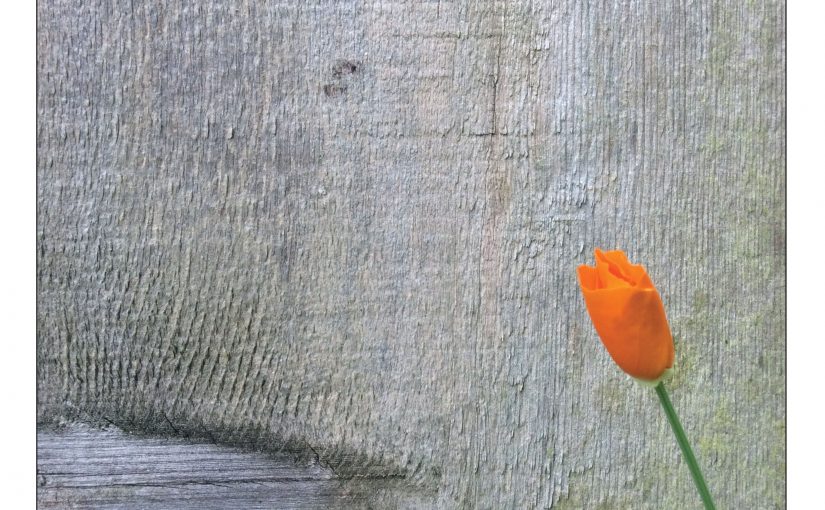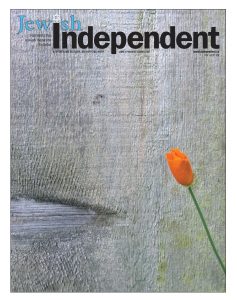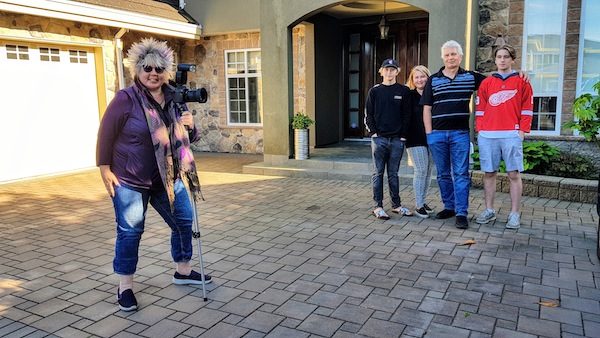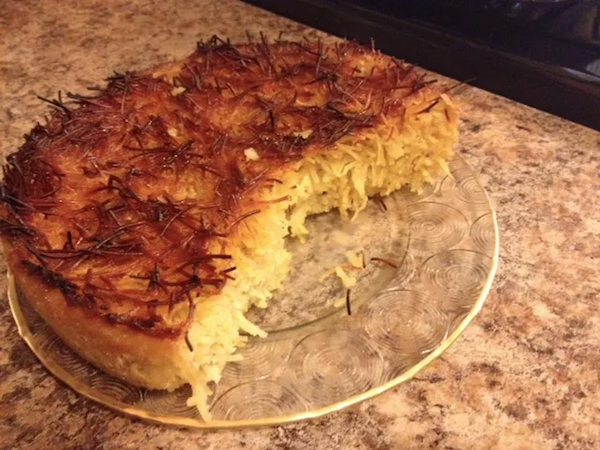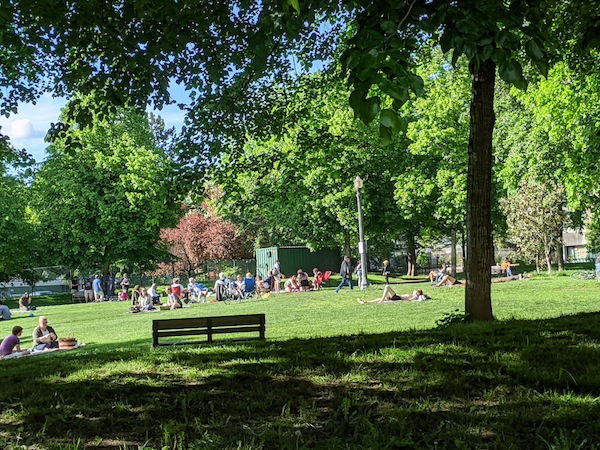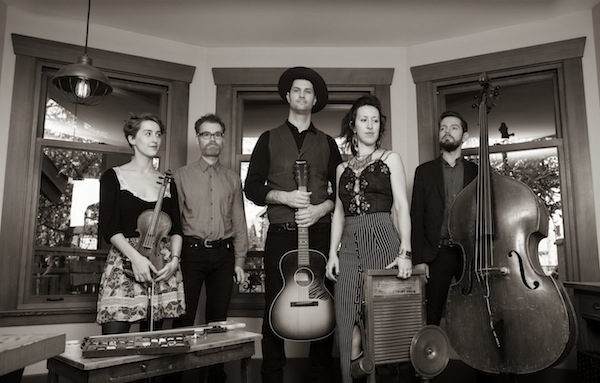Normally, this special issue would be called Summer Celebration and have a multi-page pullout calendar of events. This summer, however, is unique and more sobering. The photograph is meant to reflect our current reality. We have no idea what lies ahead but remain hopeful for a brighter future.
Tag: coronavirus
הרבה הלוויות וחתונה אחת
ראש הממשלה בנימין נתניהו
(U.S. Department of State)
המראות הקשים מהחדשות האחרונות העיבו על רוחי. המגפה הנוראית הזו גבתה את חייהם של רבים בקנדה ובעולם כולו.
מה עושים שאלתי את עצמי מספר פעמים עד שעלה במוחי רעיון מעולה. דבר שישמח את כולם. קודם כל את בת זוגתי אהובתי שתחיה, וכן השכנים, תושבי ונקובר ואולי המדינה כולה. רעיון מבריק, רעיון נפלא – התחלתי לדקלם לעצמי.
כתבתי מספר מילים על פתק קטן כדי שבטעות לא אשכח מה להגיד ברגע המתאים. רצתי בעליזות מרובה למטבח והצלחתי איכשהו לעלות על השולחן הרעוע ולעמוד עליו ביציבות לא יציבה. הוצאתי את הפתק מכיס חולצתי והתחלתי להקריא בקול חזק ורם כיאה לאיש חזק ודומיננטי כמוני. הרמתי את ידי למעלה ממש כמנהיג המטבח בדקות חשובות אלה. וכך אמרתי בהתרגשות רבתי תוך דמעות חונקות את גרוני: “אהובתי, יקירתי, אהבת חיי לנצח נצחים. אני מכריז בזאת כי לאחר שימצא החיסון למגפה שנפלה עלינו משמיים, אציע לך באופן רשמי נישואין. לאחר מכן נצא לירח דבש באחד המקומות האהובים עלינו בטבע. רק את ואני, יד ביד, לחי ללחי. אני בטוח אהובתי שהצעתי תשמח אותך, ואולי אף תרים את המורל השפוף של רבים רבים הסובלים עתה ממראות המגפה”.
לאחר סיום הנאום הצלחתי בכוחות אחרונים לרדת מהשולחן וכמעט התהפכנו שנינו. לאחר שנעמדתי על הרצפה היציבה מזיע ונושף ארוכות, הבחנתי לצערי שאהובתי כלל לא מגיבה בשמחה נוכח הצעתי הנדיבה. היא המשיכה לבהות מול מסך הטלוויזיה. באותו זמן הוקרנה סדרת טלוויזיה באנימציה שנוצרה לאחרונה בישראל. הספקתי להציץ במסך ולראות תמונה הזויה לחלוטין. ראש ממשלה מקומי שמחזיק בקרנות השלטון כעשרים שנה הצליח שוב להקים ממשלה והפעם כיאה לו היא רחבה וגדולה מאוד. האופוזיצה כך מתברר במקום להתנגד לו התחברה אליו. כך שהוא ימשיך לשבת על כיסא המלך למרות כתב אישום חמור נגדו. יקירתי נאותה סוף סוף להוריד את העיניים מהמסך ולהסתכל אלי ישירות. וכך אמרה לי בכעס רב: “נו באמת האם אתה חושב שאני טיפשה מטופשת. מחר ימצא חיסון וניתחתן? הרי זה ייקח שנים על גבי שנים. וחוץ מזה אתה חושב שאני יכולה להאמין לישראלים שכמוך. תראה על המסך איך אתם עובדים אחד על השני. וראש הממשלה שלכם עובד על כולם שוב ושוב”.
ולסיום דבר מה שכתבתי לאחרונה על ישראל:
ביבי גרם לנו אנחה ארוכה ארוכה.
ואולי בעצם הרבה אנחות או שמוטב אפילו להגיד אין ספור אנחות.
זהו שיר שלי למחות על מה שעושה ראש הממשלה הנצחי של ישראל לנצח ישראל.
כפי שאמר היוצר שלום חינוך בשירו המעולה והרלונטי היום יותר מאי פעם: “הציבור מטומטם ולכן הציבור משלם” – מה עוד צריך לקרות שבישראל יתעוררו ויבינו שראש הממשלה הוא בעצם ראש כת (משפחת נתניהו המלכותית) שמהלכת אימים על רבים ובעיקר על חלשים ועניים.
מה עוד צריך לקרות שהאזרחים יקראו את הכתובת על הקיר ויבינו שהממשלה הרחבה הנוכחית היא יריקה בפרצופם של משלמי המיסים.
לא נשכח שמתנהל משפט על חלק מחטאי ראש הממשלה והגיע הזמן שהוא ישלם מחיר על מה שעשה כי אחרת – הוא ימשיך לעשות עוד ועוד לכיסו המנופח.
אפשר להגיד את זה באנגלית או בעברית: הראש מושחת והשחיתות משתלטת על כל חלקה טובה מרחוב בלפור והלאה.
למי שגר כאן בקנדה הבעיות בישראל נראות רחוקות ואולי אף הזויות
לכן אנו גרים כאן ולא שם ולכן אנו רחוקים.
Financial hopes
In a Temple Sholom webinar May 6, ZLC Financial’s Garry Zlotnik, left, and Jon McKinney spoke on the topic Financial Planning in a Pandemic. (photos from Temple Sholom)
Reflecting on previous financial downturns – in 1987, 2000 and 2008 – Garry Zlotnik, chair and chief executive officer of ZLC Financial, admitted he felt worse now, during the COVID-19 pandemic, than in earlier recessions – not because of the economic implications but rather the health issues currently confronting the world.
“A year from now, two years from now, we’ll look back on this time and say, ‘Wow, that was just the most ridiculous, crazy thing in our lifetimes.’ But things will move forward in a positive way, with all the ingenuity that our population has,” Zlotnik said, adding that, as in any market, there are winners, such as Zoom, the web conferencing platform on which the webinar – called Financial Planning in a Pandemic – took place May 6.
Zlotnik was joined by Jon McKinney, ZLC’s president and portfolio manager, in the hour-long discussion, which was part of Temple Sholom’s Let’s Talk About It series.
McKinney holds overall responsibility for client relations, business development and administration at ZLC and has almost 30 years of financial sector experience in both portfolio management and accounting. Zlotnik, who has close to 40 years of experience as a chartered accountant and formed ZLC Wealth in 2000 – ZLC Financial was established in 1946 – also has served in numerous positions within the Jewish community, including as board president and chair of the Jewish Federation of Greater Vancouver, co-chair of the Vancouver JCC Maccabi Games, co-president of Vancouver Talmud Torah, treasurer of B’nai Brith Canada and president of the Richmond Country Club.
Though the spread of the virus has been flattening lately, the economic statistics – jobless claims, consumer spending – have been grim, with Canada’s economy further challenged by tense U.S.-China trade relations and a downward turn in the price of oil. According to McKinney, a silver lining has been the stimulus and bond buying by governments and central banks to prop up markets.
McKinney cited a Warren Buffett maxim from the midst of the 2008 recession: “Be fearful when others are greedy and be greedy when others are fearful.” If one had heeded that advice in late March of this year, he said, then April would have seen the best returns for equities since 1987, particularly as the U.S. Federal Reserve had been displaying its willingness to pump liquidity into the markets. The S&P 500 index, for example, gained 12.7% last month.
A principal message of the discussion was for investors to take a broad, long-term view. “Market timing is impossible,” McKinney cautioned. “But we can tell you there will be a bottom, and holding investments in companies that can weather this storm will be profitable long-term.”
In outlining ZLC’s own investment strategy, McKinney said, “We have reasonable diversification across different holdings and we pick good managers. We don’t just buy the index, and we look for companies that fly under the radar. We also invest in long/short funds and real estate.”
However, ZLC is concerned that there may be a retreat from the level the market is at now, as more bad news could filter through the system. Short-term, they believe, there could be a pullback and, if it comes, it will provide a great opportunity for investors.
“There are going to be some fairly volatile times ahead,” Zlotnik predicted, mentioning that it will take some time for people to get used to spending as they once did in pre-coronavirus times.
Oil and gas is one sector that has been beaten up in the past three quarters. It is, according to McKinney, contingent on the economy whether it rebounds, but many companies in the sector have seen strong gains through April and May.
“Every asset class has taken a hit,” Zlotnik said, though he sees opportunities in corporate bonds, which operate like a bond when a company’s price goes down and like equity when its price increases.
As for the Canadian dollar, McKinney forecasted the loonie either staying where it is or moving slightly higher after the recent rush to U.S. dollars, which tends to happen during economic crises.
For those with some money to put into the market, Zlotnik spoke of “dollar cost average strategy,” which means placing a fixed amount into a given investment on a regular basis. For example, if someone has $100,000 to invest, then they would place $10,000 in a given investment once a month for 10 months.
“It is important to know what one’s risk tolerance is and having a plan based on that,” he noted. Since March 2009, investment risk, for Vancouverites especially, has not been a factor, as both the equity and real estate markets have headed in an upwards direction.
A video of the webinar can be found on the Temple Sholom website: templesholom.ca/video.
Sam Margolis has written for the Globe and Mail, the National Post, UPI and MSNBC.
Favourable position
British Columbians, like others in much of the world, are stepping gingerly into what may be a post-pandemic period – or an “inter-pandemic” phase, if the predicted second wave bears out. Our daily briefings from Dr. Bonnie Henry, the provincial health officer, and Health Minister Adrian Dix are cautiously optimistic, tempered with the reality that some people, given an inch, will take a mile. Confusion around, or contempt for, changing social distancing guidelines has meant numerous instances of inappropriate gatherings.
All in all, though, British Columbians have so far experienced among the lowest proportions of COVID-related illnesses and deaths than almost any jurisdiction in the developed world. Each death is a tragedy, yet we should be grateful for those who have recovered and the fact that so many of us have remained healthy so far. Thanks should go to all those who have helped others make it through, including first responders, healthcare professionals and also those irreplaceable workers we used to take for granted: retail and service employees and others who have allowed most of us to live through this with comparatively minimal disruptions.
In our Jewish community, so many individuals and institutions have done so much, from delivering challah to providing emergency financial and other supports for those affected by the economic impacts of the pandemic.
Canadians, in general, seem to be making it through this time as well as can be expected. Polls indicate that Canadians are overwhelmingly supportive of the actions our governments have taken during the coronavirus pandemic. How the federal and provincial governments manage the continuing economic repercussions and the potential resurgence of infections in coming months will determine long-term consequences both for us and for their popularity.
In signs that things are returning to something akin to pre-pandemic normal, Binyamin Netanyahu, Israel’s once-and-still-prime minister, is complaining about a “left-wing coup” and asserting that “the entire right” is on trial. In fact, it is not an entire wing of the Israeli political spectrum that is on trial, but Netanyahu himself, for bribery, breach of trust and fraud. He is accused of exchanging favours to friends and allies in return for hundreds of thousands of dollars in trinkets like cigars and champagne, and favourable coverage in media. Whatever strategy his team has for inside the courtroom, his PR strategy is pure deflection: blame the media, the court system, political opponents. He’s fighting two trials: the one in the justice system and the one in the court of public opinion. Netanyahu has managed to save his political hide thus far, through three successive elections and a year of coalition-building and horse trading. Predicting what might happen next is a popular but fruitless pastime.
More signs that things are not so different came from U.S. President Donald Trump on the weekend. As the death toll in the United States approached 100,000, Trump took time off from golfing to deliver Twitter rants, including retweets calling Hillary Clinton a “skank” and smearing other female Democrats for their appearance. Trump also insinuated that MSNBC TV host Joe Scarborough is a murderer.
Sitting (mostly) comfortably in our homes watching such things from afar, it’s no wonder Canadians are feeling good about the way our various governments – federal and provincial, of all political stripes – are behaving these days.
PORCHpics Project
Lianne Cohen prepares to take a “PORCHtrait” of the Gorski family. (photo from Kehila Society)
As a fundraiser for Kehila Society of Richmond and/or Pathways Clubhouse, professional photographers Lianne Cohen, Jocelyne Hallé and Adele Lewin are volunteering their time (in a safe way) to photograph your family in front of your home. Dress up, stay in your PJs, hold a sign, whatever you feel like – be creative, have fun! These photos are intended to be a positive memory, to serve as a reminder of all the time you got to spend with your families in quarantine. The photographs are by a suggested minimum donation of $54 to kehilasociety.org/content/make-donation-kehila-society-richmond or pathwaysclubhouse.com/donate. A full tax receipt will be provided, along with your photographs. Bookings are available until June 7. To register, email kehila@kehilasociety.org or call 604-241-9270.
Kugel comforts during COVID
Yerushalmi kugel by Jamie Geller. (photo from jamiegeller.com)
If I’d known the world was going to be locked down because of the COVID-19 pandemic, I would have stocked up on toilet paper, disinfecting wipes and pasta much sooner. Of course, only one of those is edible.
Desperate measures call for desperate times and, when so many restaurants have closed, cooking has become mandatory. As has self-isolation. Sure, we could order takeout, but I’m still slightly paranoid about who cooks my food. After all, you’re only as healthy as the last person you were in contact with. I rest my case.
I’ve tried to be creative in the kitchen, but, when you’re used to eating sushi at least once a week and shopping for fresh food every day, it gets challenging during a lockdown. Now we eat more pasta. Way more pasta. My husband Harvey loves it. Me, not so much.
Harvey does a Costco run every so often to stock up, but I’m loathe to send him out into the dangerous spittle-filled world of COVID coughs right now. And the regular stores are often out of the basics, at least until recently. To be completely frank, I’m sick of cooking. So, what’s an accidental balabusta to do?
I’ll tell you what I did. I handed Harvey my mother’s tattered Jewish Council Cookbook the other day and pronounced: “Make something!” So, what does he choose from all those geshmak recipes? Tuna noodle casserole. You know the one – it’s composed of Campbell’s cream of mushroom soup, Kraft Dinner and a can or two of tuna. If you want to get really fancy shmancy, you can grate some aged cheddar cheese on top. It’s the quintessential comfort food. Minus the sushi. Or, in Harvey’s case, minus the tuna.
My first dip of the fork into the ooey-gooey goodness of the tuna noodle casserole elicited a squeal of surprise. It was actually delicious. Processed deliciousness, but nonetheless yummy in the extreme. The tummy wants what the tummy wants. After a few bites, I expressed my perplexity that I didn’t taste the tuna. Harvey said it had probably sunk to the bottom, so I did a deep dive to the base of the casserole dish, and … bupkis. Harvey had a go at it and, likewise, nada. He humbly walked over to the fridge, opened it, and sheepishly admitted that he’d forgotten to put in the tuna. So, we were eating KD with mushroom soup and a crusty topping of melted cheddar. It was still superb, in a plebian sort of way. Does this count as accidental balabatishness? I didn’t think so. Even if it did, I wasn’t the balabusta who made it.
I’m not proud of what we ate. But I’m sure other people have eaten worse. Much worse. Think fried Spam. Or headcheese (whatever that is). Nobody is going to raise their hand and cop to either of those atrocities, but, trust me, I know where the bodies are buried.
In the end, a casserole that I thought was going to feed us for two nights lasted three. Kind of like a tuna-based Chanukah miracle – the “excess” tuna gave its life for a couple of sandwiches, to boot. The real victory was that I didn’t have to cook for three whole nights.
Don’t think I can’t hear you yelling, “What’s the matter with you people? Haven’t you ever heard of salads?!” Well, yes, as a matter of fact, I have. And, as much as I love salads, it’s not a mutual admiration alliance. Harvey buys pre-bagged salads for himself as a side dish, but rarely do we eat a jacked-up salad for the main course. It could very well land me in the hospital, and I choose not to take that chance. Digestion issues.
By rights, I should probably have scurvy by now, but I have thankfully dodged that bullet. To get some colour in my food, I put steamed or roasted carrots in everything. Sometimes, I even eat broccoli. Is my diet restrictive? Sure. Am I relatively healthy, nonetheless? Yes – the operative word being relatively. My body happens to do well on protein. Lots and lots of protein. Animal protein. I’ll own it: I’m a card-carrying carnivore. Don’t judge me. In case you care, I used to switch things up with more varied restaurant food before COVID-19 came calling. But now that I’m relegated to my own culinary wits, things have gotten kind of serious. And not in a good way.
I am jonesing pretty bad for some agedashi tofu and salmon sashimi, but I don’t dare eat that now. I heard that, if you get takeout food, the first thing you should do is transfer it to your own dishes and reheat it in the microwave to kill off any viruses or bacteria. That’s fine for cooked food, but I believe that eating sashimi during a COVID-19 pandemic is like sticking a hand grenade in your mouth and hoping to have a pleasant day.
Desperate for some variety, I dug through my recipes and came across one for Jerusalem kugel. It still counts as pasta, but I view it as a more cultured, genteel pasta. Usually a side dish, I knew I could convince Harvey that it’s a main (especially if I served him enough of it). I figure I’ll follow it up with a roasted carrot/yam chaser. This particular kugel is satisfyingly savoury and sweet, and the recipe is by Jamie Geller.
SWEET AND PEPPERY JERUSALEM KUGEL
1 (12 ounce) package thin egg noodles
1 cup sugar
1/3 cup oil
4 eggs
1 tsp salt
1/4 tsp to 1 tsp ground pepper
- Preheat oven to 350˚F.
- Bring a pot of water to a boil. Cook noodles according to package instructions. Strain and set aside.
- Add the sugar and oil to a large pot on low heat. Stir until sugar is dissolved and a deep golden caramel colour, but not burnt. This can take 20 minutes or more.
- Turn off the heat and add the noodles into the pot of sugar. Immediately stir with a big spoon until the noodles are coated in the caramel. Don’t worry if the sugar hardens into blobs – it will melt in the oven.
- Allow the mixture to cool for about 10 minutes. Mix in the eggs, salt and pepper. (Make sure it’s cool so the eggs don’t cook.)
- Pour the mixture into a greased springform pan or baking dish. Bake for one hour.
May this COVID-19 pandemic be over with soon. In the meantime, as Dr. Bonnie Henry says: “Be kind. Be Calm. Stay safe.” As for the Accidental Balabusta, figuring out what to cook every night should be my worst problem. Ever.
Shelley Civkin, aka the Accidental Balabusta, is a happily retired librarian and communications officer. For 17 years, she wrote a weekly book review column for the Richmond Review. She’s currently a freelance writer and volunteer.
An unfair funeral
This article was posted on medium.com on May 20 with the title “Bouncing from a COVID funeral,” and is reprinted with permission.
I had a loss in my family this weekend. It was not related to COVID. Nonetheless, it has been an exceptionally challenging time to lose a loved one. There are no mourning rituals, or figurative closures or moments to console the ones who are hurting the most. There are no hugs or shmoozing or recounting memories or poring over old picture albums around a coffee cake and a cup of tea (you get the idea: insert any of your traditions or rituals here).
Loss and death are concepts I struggle with, like most people. I always feel like I cannot say the right thing and feel awkward in the presence of those hurting the most. I am not “good” at funerals or mourning phases. I generally show up, pay my respects, and bounce.
What makes losing life during this unique time in history so hard is that we are mandated to be socially distant. However, when death hits the one we know and love, it is so heartbreaking, I want to so badly be socially closer, more than ever before. I would not have bounced. I would have stayed and been present.
Today, at 2 p.m., I will sit on a Zoom call to pay my respects. I will send a meal to the homes of the mourners. My father will be one of 10 that is allowed at the graveside service. He will wear his masks and gloves and stand six feet apart from his sister and nieces.
This seems grossly unfair, for a person whose funeral would have attracted people counting in the hundreds.
I cannot show up at this funeral even if I wanted to. I can sit in my house and watch it all go down on a live stream. It feels so cheap and lame and gross. Not the tribute that this person deserves.
The learning for me – as we sit together, alone, living a socially dis-social lifestyle for the foreseeable future, what small acts of kindness, generosity, pay it forward, TLC and tenderness can I express to just one other person to enrich their lives?
When I close my eyes and I imagine the eulogy recited at the end of my time on this earth, I wonder, what will I be remembered for?
I challenge you: what will you be remembered for?
Are you proud of the life you have lived?
How would you want to go down in the books?
What is your legacy, big or small?
It’s a morbid thought – not a place I often go but feel compelled to address, given the nature of the planet and the nature of my family’s pain.
My heart aches for anyone who has lost anyone during this truly f*cked up moment in time.
May your memory be a blessing.
Alana Kayfetz Kantor is founder and chief executive officer at MomsTO and MOMFEST, and co-host of Moms That Say F*ck the Podcast.
Keeping busy in lockdown
When someone suggested this as the title of an article I should write, I roared with laughter. Me, who has been climbing the walls, thinking of taking to drink, or killing myself or others. But, after all, I pride myself on being creative, so I decided to have a stab at it.
I am very communal-minded, so I thought I should entertain the neighbours. I don’t play any instrument, but I know hundreds of songs dating back to the 1940s. In my imagination, I saw all my Jerusalem neighbours coming out to join in, sending their children to the street below to dance, keeping their social distance, of course. Well, that’s not exactly what happened. After I began singing – I chose my favourite aria from Madame Butterfly, “One Fine Day” – what I heard was doors being closed with great force and windows being slammed down. But, I persevered, until all the birds in the trees outside my balcony decided to migrate early this year and flew off to Australia or Siberia (whichever was the furthest), and even the cats that hang around our building also disappeared.
I next decided I could keep busy by tidying up my office. I know I have a very nice writing desk. I haven’t actually seen it for a few years because my printer sits on it, plus a pile of ideas for articles and stories that I intend to use one day. I decided to be ruthless and get rid of them, but then I thought I should read them first, after which I decided maybe to keep them for happier times. At least, this activity kept me busy for a couple of hours.
By then, it was lunch time, and I decided to use my creativity to prepare a gourmet meal for my husband from the ingredients I could find, after not having gone shopping for about five weeks. I put things on the kitchen counter and looked at them: one sad-looking turnip, some potatoes, three packets of desiccated coconut (where did they come from?), a tin of chickpeas and a packet of potato flour left over from Pesach. This assortment really taxed my imagination, especially as my husband, these last few days, has been giving me looks that say, “You don’t really expect me to eat this!” I haven’t done violence to him yet, which is a tribute to my self-restraint. Oh, I’ve thought about it, and I think a good lawyer could get me acquitted if I did – I’m sure there’s something called “justifiable homicide.”
I did the laundry, and then made the mistake of looking in the mirror. My hair hasn’t had the tender ministrations of a hairdresser for more than a month. I’m reminded of the song “The Surrey with the Fringe on Top” from the musical Oklahoma. I now have a fringe – or “bangs,” as I think North Americans say – and a strange triangle of hair that sticks out on the side. It is very depressing, but, if I put on my facemask and use the elastic to push it away, it doesn’t look too bad. In fact, when I wear the facemask, I look quite good.
So, I guess I am keeping busy under lockdown after all. I would like to say that I keep a balanced diet – a block of dark chocolate in one hand and a block of milk chocolate in the other – but I don’t actually have any chocolate. I like the story of a doctor who told his elderly patient that it would be a good idea if she put a bar in her shower, and she did – with bottles of whiskey, brandy, wine and vodka. I can’t do it though, because my soap holder won’t support even a bottle of wine.
Nonetheless, I hope I’ve given readers some ideas of how to keep busy under the restrictions that COVID-19 requires. It’s just a matter of initiative and creativity, and the time will pass constructively. I wish everyone good health until this traumatic time comes to an end.
Dvora Waysman is a Jerusalem-based author. She has written 14 books, including The Pomegranate Pendant, which was made into a movie, and her latest novella, Searching for Sarah. She can be contacted at dwaysman@gmail.com or through her blog dvorawaysman.com.
ונקובר מתחילה להיפתח מחדש לאט לאט
תושבים נהנים מהשמש החמה בפארק נלסון
(רוני רחמני)
כבר למעלה מחודשיים שאנו נמצאים בסגר שלא היה כמותו מעולם. המראות מוונקובר ומשאר רחבי קנדה דומים למה שאנו רואים בעולם: רחובות ריקים, תורים ליד חנויות האוכל, הרבה שקט מסביב והטלוויזיות פועלות בבתים בהיקף שלא היה כדומתו מאז באו לעולם.
אני למזלי עובד מהבית מזה כשלוש שנים כך שלא הרגשתי שינוי משמעותי בגיזרה הזו, אם כי היקפי העבודה ירדו ובשלב זה קשה לאמוד את הנזקים הכספיים אצלנו בחברה. בתום יום העבודה במקום לקפוץ למכון הכושר בבניין ולרכב על אופניים ארבעים דקות, ולגמוע כאחד עשר עד שניים עשר קילומטרים, אני יוצא לצעוד ברחובות של ונקובר. אם אצעד בטיילת שליד הים אראה רבים רבים כמוני שהולכים להם, רצים, רוכבים על אופניים או סתם יושבים על הדשא ותופסים שמש. אם אחפש מקומות ריקים יותר אז אלך ברחובות העיר, מהדאון טאון החוצה דרך שלושת הגשרים שמחברים אותו עם החלק המערבי או המזרחי של ונקובר. אבל זה לא כל כך נעים נעים לצעוד היום ברחובות הכמעט ריקים של ונקובר. ההרגשה כבדה מה גם שמרבית חלונות הראווה של החנויות מכוסים בלוחות עץ כדי שלא יפרצו פנימה. ההומלסים נראים במספרים גדולים יותר וחלקם השתכנו להם בפתחי החנויות הסגורות. בערב רחובות העיר כל כך שקטים וריקים. נראה כאילו עוצר מלחמתי הוכרז על ידי השלטונות.
בפועל המלחמה היא מול אויב שאיננו רואים או שומעים אותו והוא עושה בנו שמות. אויב אכזרי מאין כמוה שגרם למותם של למעלה משלוש מאות אלף איש בעולם וגרם ליותר מארבעה וחצי מיליוני אנשים לחלות. מגפה של ממש.
ונקובר כמו ערים אחרות הפכה למשהו אחר, סיפמפטי פחות, נעים פחות, שקט הרבה יותר. אנו מתעוררים כל בוקר למציאות שלא הכרנו וכל הימים נראים דומים. לא פעם שאלתי את בת הזוג שלי האם היום זה יום שלישי והיא ענתה בפסקנות: “היום דווקא זהו יום רביעי”. בפעם אחרת חשבתי שמדובר ביום חמישי אך בפועל זה היה כבר יום שישי. החדשות הן אותן חדשות, הרעות הן אותן רעות והחיים כמעט עצרו מלכת.
לאור החדשות הטובות יותר שמספר המתים והחולים יורד בהתמדה במחוז בריטיש קולומביה שלנו, הממשלה המקומית הודיעה כי אנו מתחילים לפתוח את המשק לאט לאט. הממשלה קבעה תוכנית בת ארבעה שלבים כאשר בעצם השלב הראשון הוא השלב בו אנו מצאים כיום, כיוון שהמשק עבר לשעת חירום וכן מספר מגזרים המשיכו לפעול. כמו למשל תחבורה ציבורית, בניית ותיקון תשתיות, בניית ותיקון בניינים, חנויות מזון ועוד. השלב הרביעי והאחרון בתוכנית הוא פתיחה מלאה של המשק וזה יקרה שימצא החיסון היקר מפז לחיידק הקורונה הנוראי הזה. לכן אנו עוברים בימים הקרובים שלב השני בתוכנית הממשלתית. כבר בימים האחרונים ראיתי התעוררות ברחבי העיר. יותר אנשים ברחובות, בפרקים ובטיילות. יותר חנויות פתוחות. ההמשך יבוא.
לסיום שיר חדש שכתבתי לאחרונה:
אם אין מים נשתה חלב של פרה אדומה
אם אין חשמל נקושש עצים חומים ונעשה מדורה חמה
אם אין גז נעטוף את הבית בנילונים לבנים ארוכים ונרגיש כמו בחממה
אם לא נוכל לקרוא נתחיל לכתוב שירים ארוכים וסיפורים קצרים
אם לא נוכל לשמוע מוזיקה נתחיל להקיש במקלות רחבים על מחבתות וסירים גדולים
אם לא נוכל לצפות בטלוויזיה נעמוד במרכז החדר ונתחיל לנאום ארוכות על מה שקרה ועל עתיד המבריאים הרבים והחולים המעטים.
Old and new favourite songs
The Burying Ground core duo is Woody Forster and Devora Laye, centre. On their newest album, they are joined by, left to right, Clara Rose, Joshua Doherty and Wynston Minckler. (photo by Mary Matheson)
The Burying Ground had a busy spring and summer planned, with dozens of performances scheduled around the release of their new album, A Look Back, this month. Then COVID-19 arrived and all those shows had to be canceled. Nonetheless, the band has carried on, releasing two singles already, and the full album comes out today, May 15.
“It was hard to let go of all the plans we’d been looking forward to but there’s not much we can do about that part so we haven’t let it get us too down (yet),” Jewish community member Devora Laye told the Independent. Laye, who is part of the core duo of the band, with partner Woody Forster, was philosophical.
“I do think it is important to recognize that we are all grieving in different ways and having to accept the disappointment that comes with all plans changed, canceled or on hold,” she said. “I also want to acknowledge that these plans feel small and that is why I think for me, personally, I haven’t gotten too down about my/our situation. It is a small struggle in the overall picture. We are OK. We are grateful to have what we need, to have each other and to be in this beautiful place by ocean and forest. I feel very sad for people who are suffering the most from this pandemic.”
While yet to live stream a concert, Laye and Forster are making plans for online shows. In the meantime, they are working on new material, which Forster said they “are hoping to iron out in the coming months.”
“I’ve been playing some guitar and Woody has been playing mandolin, which has been really fun!” said Laye, who does washboard, saw and vocals. “We have also been spending more time working on harmonies … [and] finishing up some original songs…. We’re thinking we’ll have enough material for another album later this year or by early next year.”
Their new release, A Look Back, was recorded in January. Forster said the band – he and Laye, plus Wynston Minckler (upright bass), Clara Rose (fiddle and harmonies) and Joshua Doherty (harmonica and harmonies), who have been accompanying the duo on the road for the last couple of years – were planning to be touring with hard copies of it, starting in the spring, to help fund its creation.
“The plan was to hit the road with our new CD on May 1st to play a handful of gigs on Vancouver Island and release the album to those audiences first,” said Laye, who had spent hundreds of hours booking the album shows. “We were looking forward to a 10-day tour to California, starting May 15th, including Northwest Folklife Festival in Seattle. June 5th, we were scheduled to play our local album release show at the Rogue Folk Club at James Hall in Vancouver; we were over the moon to play our album release at one of the best venues around.
“Anyhow, to sum it up – we were expecting to raise enough to press the physical album through our March and early April shows, however, because those didn’t happen, we didn’t have the funds to press the album just yet.”
Hence, releasing the two singles in advance, as well as allowing people to pre-order the album. But pragmatism wasn’t the only deciding factor.
“We really miss playing with the band and playing for crowds and, to be honest, as soon as the final masters came in, I was very eager to share at least some of the music with our family, friends and fans ASAP!” said Laye. “It’s a way to connect with people during the quarantine – I miss the in-person connections and energy from live shows but, for now, we will hope that our songs and the songs we’ve chosen to cover will be a little taste of that connection. I like to imagine that people who are listening to our music are also dancing in their kitchens – or wherever else they like to dance, in a socially distant way.”
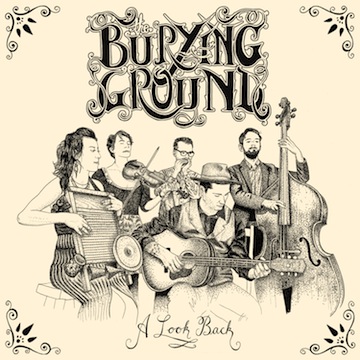 The first single released, on April 17, was “How Long.” On the band’s Facebook page, Laye notes that it “is the very first song that we wrote for the Burying Ground. It’s a song about waiting for hard times to pass and better days to come.”
The first single released, on April 17, was “How Long.” On the band’s Facebook page, Laye notes that it “is the very first song that we wrote for the Burying Ground. It’s a song about waiting for hard times to pass and better days to come.”
“‘How long ’til my luck’s gonna change’ is the chorus,” she told the Independent. “We typically play this one with crowd participation, which always puts a smile on our faces and helps us connect with the audience. It’s a relatable song about hard times and ‘bad luck.’ It’s a song that deals with struggle, not knowing when the struggle will end. We felt like it’s relatable to our times right now. When I chatted to our recording engineer, Marc L’Esperance, about our release plan/idea, he mentioned that ‘How Long’ is his favourite song off the album and thought it would be an appropriate song to release first.”
“How Long” was first recorded in 2014 and it appears on the Burying Ground first album, Big City Blues. Country Blues & Rags was their next recording, followed by The Burying Ground. (For more on the Burying Ground, see jewishindependent.ca/reinventing-old-time-music.)
On May 1, the band released the second single from A Look Back. Called “Please Don’t Talk About Me When I’m Gone,” Laye said she first heard the song on a Washboard Rhythm Kings recording made circa 1930. “I love it,” she said. “The music and the words. A couple years back, we heard Leon Redbone’s version (who happens to be one of Woody’s favourites). Redbone’s take on the song struck a chord with us and the rendition we’ve recorded is more in that vein.”
“Our music is and always has had a deep connection to older traditional styles that we love to pay homage to,” Forster added. He said the leading song on the new album, “Diving Duck,” was one of the first blues songs he ever learned, “so it felt like a fitting tune to kick the album off with. The recording I first heard of this song was with Sleepy John Estes and Yank Rachell, two great early blues musicians whose guitar and mandolin playing left an early mark for me musically.”
“Behind These Eyes” also has personal meaning for Forster and was one of the early songs that he wrote for the Burying Ground. “It stems from a story my grandfather had told me about his father and his two uncles, who went overseas to fight in the First World War in 1914,” explained Forster. “The war left one of his uncles unable to mentally deal with the things he had seen upon returning home. It was a powerful conversation for me and I feel like, with the current awareness now of PTSD that did not exist at that time, it made me really think about what he may have gone through.”
About the song “C Rag,” Forster said, “All of us being big fans of the guitar virtuosity of Gary Davis and his contribution to fingerstyle guitar, we felt that this instrumental number fit perfectly into the record.” And the Burying Ground pays tribute to another great American blues and ragtime musician on A Look Back, Arthur (“Blind”) Blake, doing their interpretation of Blake’s “Hey Hey Daddy Blues.”
The new album also includes the song “You Gotta Live So God Can Use You.”
“Early gospel music played such an important role in all of the music that we love from the early 20th century and we wanted to have this represented on our record,” said Forster. “The song may date back to the late 1800s, though I am not sure, but it is definitely the oldest tune we play.”
Rounding out the album is the Burying Ground’s take on “My Blue Heaven.”
“In the last couple years,” said Forster, “the band has been experimenting more with including early jazz songs into our repertoire and ‘My Blue Heaven’ instantly sat really well with the band. Devora’s saw playing gives it a dream-like quality, which seemed to suit the song so well and made it a fitting number to close the album with.”
In addition to A Look Back, Forster and Laye have put online for purchase the album Dire Wolves by the Dire Wolves.
“We’ve been wanting to put the album up online for awhile but, as we haven’t been a real band for some years now, it’s slipped our minds,” explained Laye. “When the quarantine time began and we had all this unexpected time on our hands, we figured it’d be a good time to get it up online. We love the album!”
The album was recorded in 2010, said Laye, but released in 2012. She, Forster, Doherty (who has been a member of the Burying Ground since the beginning) and Blake Bamford (lead vocals, guitar) comprised the group.
“Those boys played music together pre-Dire Wolves, in a group called the Whiskey Jacks (2004- 2007). I sat in on washboard for a handful of Whiskey Jacks gigs!” said Laye. “We also played with Joseph Lubinsky-Mast, who has become one of Vancouver’s finest and most in-demand upright bass players; he toured and recorded with the Burying Ground until the end of 2018. We’ve all been friends for a long time and, back then, we didn’t really know anyone else playing traditional styles of folk (blues, stringband) music.
“When Blake Bamford, aka Big Fancy, moved up north to a rural farm in Fort Fraser, B.C., the Dire Wolves split ways,” she said. “Woody and I were left without a band, without a guitar player and lead singer and wanted to continue playing music in a similar vein. That’s when he started learning guitar – and it became his main instrument. I got more serious about percussion and I started to sing (in public)!” Thus, the Burying Ground came into being.
While grateful for their relatively good situation, Laye admitted, “The uncertainty is tricky. Do we continue booking tours? Do we wait it out? All events have been canceled for the summertime. Will September be different? Woody and I are booked for a two-week tour (as a duo) in October. Will that happen? I would normally be contacting venues on our route to book, I haven’t. Artists are at a loss as to how to go forward…. So many venues don’t even know how they’ll make it through this.”
She concluded, “I hope we can come out of this to a better, more connected, world. A world where we take care of each other: humans, plants, animals and the planet that sustains us.
“We miss playing shows and connecting with people all over,” she said, “and really look forward to whenever it is that we can do that again.”
The band’s website is theburyingground.com.

